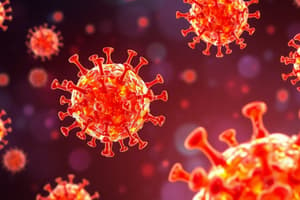Podcast
Questions and Answers
What is the primary natural source of vitamin D3?
What is the primary natural source of vitamin D3?
- Dietary supplements
- Dermal synthesis (correct)
- Injections
- Oral medications
Which of the following best describes the mechanism of action of vitamin D analogues?
Which of the following best describes the mechanism of action of vitamin D analogues?
- Degradation of T-cell receptors
- Direct interaction with immune cells
- Inhibition of vitamin D receptor degradation
- Activation of vitamin D responsive elements (correct)
What common local skin reactions may occur from the use of vitamin D analogues?
What common local skin reactions may occur from the use of vitamin D analogues?
- Flaking skin
- Hyperpigmentation
- Excessive dryness
- Itching and erythema (correct)
What role does vitamin D play in the body?
What role does vitamin D play in the body?
Which function do cytokines perform in the immune response?
Which function do cytokines perform in the immune response?
What is a potential downside of using vitamin D analogues in treatment?
What is a potential downside of using vitamin D analogues in treatment?
In terms of immunomodulators, what is their primary intended effect?
In terms of immunomodulators, what is their primary intended effect?
What is the role of the vitamin D receptor (VDR) when activated?
What is the role of the vitamin D receptor (VDR) when activated?
What is the main mechanism of action of topical Vitamin D analogues?
What is the main mechanism of action of topical Vitamin D analogues?
What role do cytokines play in skin diseases?
What role do cytokines play in skin diseases?
How do immunomodulators exert their effect in dermatology?
How do immunomodulators exert their effect in dermatology?
Which of the following is a consequence of Vitamin D synthesis in the skin?
Which of the following is a consequence of Vitamin D synthesis in the skin?
Which of the following corticosteroids is considered very potent?
Which of the following corticosteroids is considered very potent?
What is the expected outcome of corticosteroids' anti-inflammatory effect in dermatology?
What is the expected outcome of corticosteroids' anti-inflammatory effect in dermatology?
Which type of skin condition are topical corticosteroids primarily used to treat?
Which type of skin condition are topical corticosteroids primarily used to treat?
Which of the following is not a consequence of steroid hormone receptor complex (SHRC) activity?
Which of the following is not a consequence of steroid hormone receptor complex (SHRC) activity?
Which of the following statements accurately describes the role of cytokines in the immune system?
Which of the following statements accurately describes the role of cytokines in the immune system?
What is the mechanism of action of Pimecrolimus and Tacrolimus in treating skin conditions?
What is the mechanism of action of Pimecrolimus and Tacrolimus in treating skin conditions?
Which pathway is NOT one of the primary pathways used by cytokines to mediate their effects?
Which pathway is NOT one of the primary pathways used by cytokines to mediate their effects?
Which biologic drug specifically targets TNFα in the treatment of psoriasis?
Which biologic drug specifically targets TNFα in the treatment of psoriasis?
Which topical agent is primarily used for the treatment of severe eczema and psoriasis?
Which topical agent is primarily used for the treatment of severe eczema and psoriasis?
How do cytokines affect cell proliferation and apoptosis?
How do cytokines affect cell proliferation and apoptosis?
Which immunomodulator has an unclear mechanism of action despite its use in severe psoriasis treatment?
Which immunomodulator has an unclear mechanism of action despite its use in severe psoriasis treatment?
Which of the following is NOT a function of cytokines?
Which of the following is NOT a function of cytokines?
Flashcards are hidden until you start studying
Study Notes
Cytokines and Their Roles
- Cytokines are signaling molecules produced by various cells, including immune, endothelial, fibroblast, and stromal cells.
- They play crucial roles in immune responses, regulating the balance between humoral and cell-mediated immunity.
- Cytokines operate through receptors and initiate several downstream pathways, notably the JAK-STAT and NF-kB pathways.
- Persistently released cytokines can contribute to chronic diseases through dysregulated immune responses.
Immunomodulators
- Topical immunomodulators include Pimecrolimus (Elidel®) and Tacrolimus (Protopic®), used primarily for skin conditions like psoriasis, eczema, and acne.
- Pimecrolimus and Tacrolimus inhibit T-cell activation and cytokine release by binding to macrophilin-12 (FKBP) and inhibiting calcineurin (CaN).
- Systemic immunomodulators include Infliximab, Adalumimab (Humira®), Methotrexate, Cyclosporin, and Etanercept, targeting severe eczema and psoriasis.
Infliximab and Adalumimab
- Infliximab is designed to neutralize TNFα, crucial in inflammatory pathways.
- Adalumimab is a chimeric monoclonal antibody that binds TNFα, blocking its receptor interaction, aiding in managing psoriasis and psoriatic arthritis.
Methotrexate
- The exact mechanism of Methotrexate is unclear but involves modulation of immune responses.
- It is linked to vitamin D3 synthesis, essential for calcium/phosphate metabolism and immune regulation.
Vitamin D Analogues
- Topical vitamin D analogues (e.g., calcipotriol, calcitriol, tacalcitol) treat plaque psoriasis while being avoided in calcium metabolism disorders due to skin reactions.
- Vitamin D analogues act through the Vitamin D Receptor (VDR), impacting gene pathways to reduce cell proliferation, promote apoptosis, and inhibit T-cell activation.
Mechanism of Action of Vitamin D
- The VDR activation leads to the transcription of genes that mitigate inflammation and enhance skin health.
- The roles of vitamin D extend to immune system regulation and bone health.
Corticosteroids
- Essential in treating various skin inflammatory conditions like eczema, contact dermatitis, and insect bites.
- Topical corticosteroids vary in potency: Hydrocortisone (mild), Clobetasone (moderate), Diflucortolone (potent), Betamethasone (very potent), and Clobetasol (ultra-potent).
- Oral corticosteroid, such as Prednisone, may be prescribed in severe cases.
Mechanism of Action of Corticosteroids
- Corticosteroids exert anti-inflammatory effects by binding to glucocorticoid receptors (GR).
- The Steroid Hormone Receptor Complex (SHRC) translocates to the nucleus, binding to DNA and facilitating mRNA transcription changes, enhancing protein production related to inflammation control.
Studying That Suits You
Use AI to generate personalized quizzes and flashcards to suit your learning preferences.




